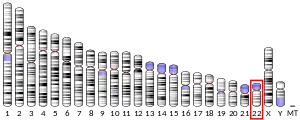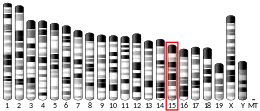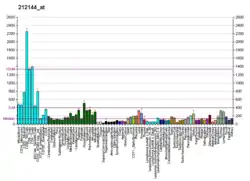UNC84B
Protein unc-84 homolog B is a protein that in humans is encoded by the UNC84B gene.[5][6][7]
References
- GRCh38: Ensembl release 89: ENSG00000100242 - Ensembl, May 2017
- GRCm38: Ensembl release 89: ENSMUSG00000042524 - Ensembl, May 2017
- "Human PubMed Reference:". National Center for Biotechnology Information, U.S. National Library of Medicine.
- "Mouse PubMed Reference:". National Center for Biotechnology Information, U.S. National Library of Medicine.
- Raff JW (Feb 2000). "The missing (L) UNC?". Curr Biol. 9 (18): R708–10. doi:10.1016/S0960-9822(99)80446-1. PMID 10508607.
- Malone CJ, Fixsen WD, Horvitz HR, Han M (Aug 1999). "UNC-84 localizes to the nuclear envelope and is required for nuclear migration and anchoring during C. elegans development". Development. 126 (14): 3171–81. doi:10.1242/dev.126.14.3171. PMID 10375507.
- "Entrez Gene: UNC84B unc-84 homolog B (C. elegans)".
Further reading
- Andersson B, Wentland MA, Ricafrente JY, et al. (1996). "A "double adaptor" method for improved shotgun library construction". Anal. Biochem. 236 (1): 107–13. doi:10.1006/abio.1996.0138. PMID 8619474.
- Yu W, Andersson B, Worley KC, et al. (1997). "Large-scale concatenation cDNA sequencing". Genome Res. 7 (4): 353–8. doi:10.1101/gr.7.4.353. PMC 139146. PMID 9110174.
- Ishikawa K, Nagase T, Suyama M, et al. (1998). "Prediction of the coding sequences of unidentified human genes. X. The complete sequences of 100 new cDNA clones from brain which can code for large proteins in vitro". DNA Res. 5 (3): 169–76. doi:10.1093/dnares/5.3.169. PMID 9734811.
- Dunham I, Shimizu N, Roe BA, et al. (1999). "The DNA sequence of human chromosome 22". Nature. 402 (6761): 489–95. Bibcode:1999Natur.402..489D. doi:10.1038/990031. PMID 10591208.
- Hoffenberg S, Liu X, Nikolova L, et al. (2000). "A novel membrane-anchored Rab5 interacting protein required for homotypic endosome fusion". J. Biol. Chem. 275 (32): 24661–9. doi:10.1074/jbc.M909600199. PMID 10818110.
- Hartley JL, Temple GF, Brasch MA (2001). "DNA cloning using in vitro site-specific recombination". Genome Res. 10 (11): 1788–95. doi:10.1101/gr.143000. PMC 310948. PMID 11076863.
- Wiemann S, Weil B, Wellenreuther R, et al. (2001). "Toward a catalog of human genes and proteins: sequencing and analysis of 500 novel complete protein coding human cDNAs". Genome Res. 11 (3): 422–35. doi:10.1101/gr.GR1547R. PMC 311072. PMID 11230166.
- Grønborg M, Kristiansen TZ, Stensballe A, et al. (2003). "A mass spectrometry-based proteomic approach for identification of serine/threonine-phosphorylated proteins by enrichment with phospho-specific antibodies: identification of a novel protein, Frigg, as a protein kinase A substrate". Mol. Cell. Proteomics. 1 (7): 517–27. doi:10.1074/mcp.M200010-MCP200. PMID 12239280.
- Sun G, Yuen Chan S, Yuan Y, et al. (2002). "Isolation of differentially expressed genes in human heart tissues". Biochim. Biophys. Acta. 1588 (3): 241–6. doi:10.1016/S0925-4439(02)00171-0. PMID 12393179.
- Strausberg RL, Feingold EA, Grouse LH, et al. (2003). "Generation and initial analysis of more than 15,000 full-length human and mouse cDNA sequences". Proc. Natl. Acad. Sci. U.S.A. 99 (26): 16899–903. Bibcode:2002PNAS...9916899M. doi:10.1073/pnas.242603899. PMC 139241. PMID 12477932.
- Schirmer EC, Florens L, Guan T, et al. (2003). "Nuclear membrane proteins with potential disease links found by subtractive proteomics". Science. 301 (5638): 1380–2. Bibcode:2003Sci...301.1380S. doi:10.1126/science.1088176. PMID 12958361. S2CID 23832536.
- Ibarrola N, Kalume DE, Gronborg M, et al. (2004). "A proteomic approach for quantitation of phosphorylation using stable isotope labeling in cell culture". Anal. Chem. 75 (22): 6043–9. doi:10.1021/ac034931f. PMID 14615979.
- Collins JE, Wright CL, Edwards CA, et al. (2005). "A genome annotation-driven approach to cloning the human ORFeome". Genome Biol. 5 (10): R84. doi:10.1186/gb-2004-5-10-r84. PMC 545604. PMID 15461802.
- Gerhard DS, Wagner L, Feingold EA, et al. (2004). "The status, quality, and expansion of the NIH full-length cDNA project: the Mammalian Gene Collection (MGC)". Genome Res. 14 (10B): 2121–7. doi:10.1101/gr.2596504. PMC 528928. PMID 15489334.
- Wiemann S, Arlt D, Huber W, et al. (2004). "From ORFeome to biology: a functional genomics pipeline". Genome Res. 14 (10B): 2136–44. doi:10.1101/gr.2576704. PMC 528930. PMID 15489336.
- Crisp M, Liu Q, Roux K, et al. (2006). "Coupling of the nucleus and cytoplasm: role of the LINC complex". J. Cell Biol. 172 (1): 41–53. doi:10.1083/jcb.200509124. PMC 2063530. PMID 16380439.
- Mehrle A, Rosenfelder H, Schupp I, et al. (2006). "The LIFEdb database in 2006". Nucleic Acids Res. 34 (Database issue): D415–8. doi:10.1093/nar/gkj139. PMC 1347501. PMID 16381901.
This article is issued from Wikipedia. The text is licensed under Creative Commons - Attribution - Sharealike. Additional terms may apply for the media files.




